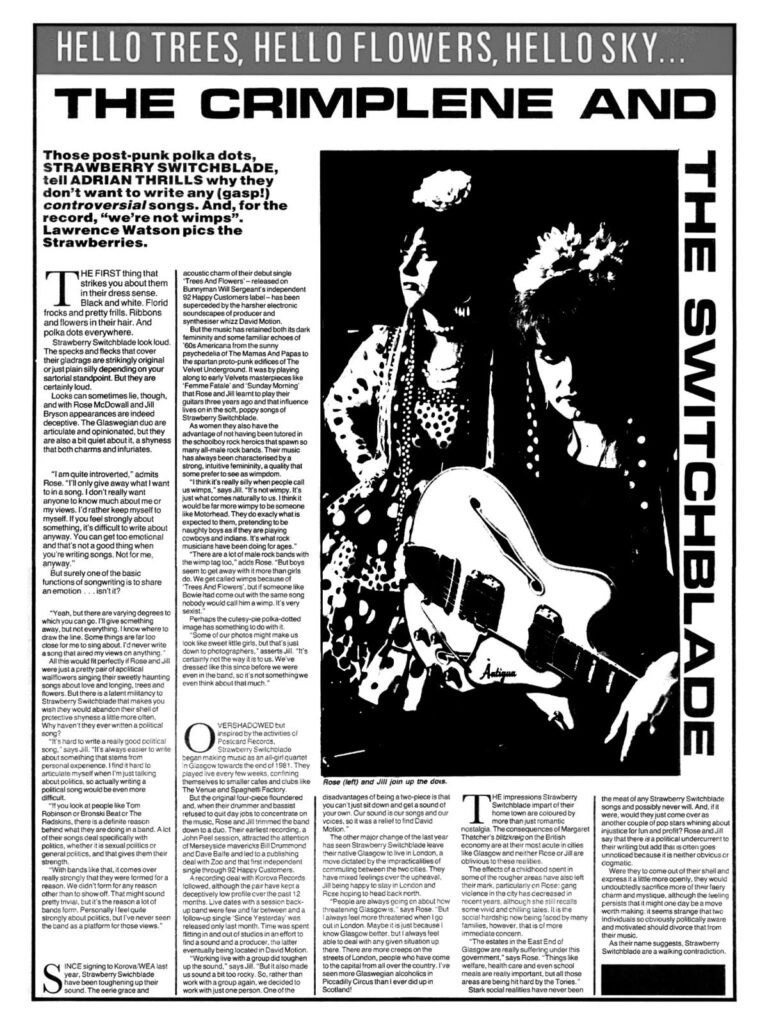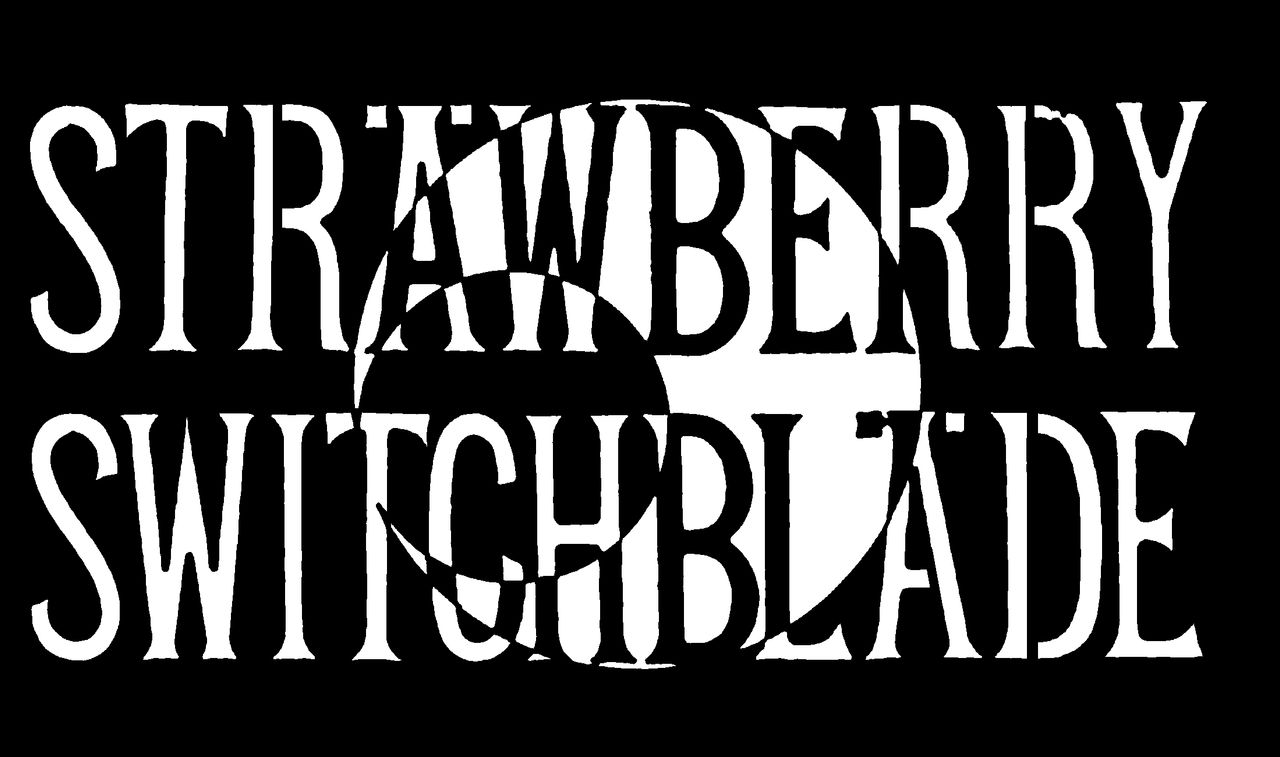New Musical Express
1 December 1984
 THE CRIMPLENE AND THE SWITCHBLADE
THE CRIMPLENE AND THE SWITCHBLADE
Those post-punk polka dots, STRAWBERRY SWITCHBLADE, tell ADRIAN THRILLS why they don’t want to write any (gasp!) CONTROVERSIAL songs. And, for the record, “we’re not wimps”.
The first thing that strikes you about them is their dress sense. Black and white. Florid frocks and pretty frills. Ribbons and flowers in their hair. And polka dots everywhere.
Strawberry Switchblade look loud. The specks and flecks that cover their gladrags are strikingly original or just plain silly depending on your sartorial standpoint. But they are certainly loud.
Looks can sometimes lie, though, and with Rose McDowall and Jill Bryson appearances are indeed deceptive. The Glaswegian duo are articulate and opinionated, but they are also a bit quiet about it, a shyness that both charms and infuriates.
“I am quite introverted,” admits Rose. “I’ll only give away what I want to in a song. I don’t really want anyone to know much about me or my views. I’d rather keep myself to myself. If you feel strongly about something, it’s difficult to write about it anyway. You can get too emotional and that’s not a good thing when you’re writing songs. Not for me, anyway.”
But surely one of the basic functions of songwriting is to share an emotion… isn’t it?
“Yeah, but there are varying degrees to which you can go. I’ll give something away, but not everything. I know where to draw the line. Some things are far too close for me to sing about. I’d never write a song that aired my views on anything.”
All this would fit perfectly if Rose and Jill were just a pretty pair of apolitical wallflowers singing their sweetly haunting songs about love and longing, trees and flowers. But there is a latent militancy to Strawberry Switchblade that makes you wish they would abandon their shell of protective shyness a little more often. Why haven’t they ever written a political song?
“It’s hard to write a really good political song,” says Jill. “It’s always easier to write about something that stems form personal experience. I find it hard to articulate myself when I’m just talking about politics, so actually writing a political song would be even more difficult.
“If you look at people like Tom Robinson or Bronski Beat or The Redskins, there is a definite reason behind what they are doing in a band. A lot of their songs deal specifically with politics, whether it is sexual politics or general politics, and that gives them their strength.
“With bands like that, it comes over really strongly that they were formed for a reason. We didn’t form for any reason other than to show off. That might sound pretty trivial, but it’s the reason a lot of bands form. Personally I feel quite strongly about politics, but I’ve never seen the band as a platform for those views.”
Since signing to Korova/WEA last year, Strawberry Switchblade have been toughening up their sound. The eerie grace and acoustic charm of their debut single ‘Trees And Flowers‘ – released on Bunnyman Will Sergeant’s 92 Happy Customers label – has been superceded by the harsher electronic soundscapes of producer and synthesiser whizz David Motion.
But the music has retained both its dark femininity and some familiar echoes of 60s Americana from the sunny psychedelia of The Mamas And Papas to the Spartan proto-punk edifices of the Velvet Underground. It was by playing along to early Velvets masterpieces like ‘Femme Fatale’ and ‘Sunday Morning’ that Rose and Jill learnt to play their guitars three years ago. And that influence lives on in the soft, poppy songs of Strawberry Switchblade.
As women they also have the advantage of not having been tutored in the schoolboy rock heroics that spawn so many all-male rock bands. Their music has always been characterised by a strong, intuitive femininity, a quality that some people prefer to see as wimpdom.
“I think it’s really silly when people call us wimps,” says Jill. “It’s not wimpy. It’s just what comes naturally to us. I think it would be far more wimpy to be someone like Motorhead. They do exactly what is expected to them, pretending to be naughty boys as if they are playing cowboys and Indians. It’s what rock musicians have been doing for ages.”
“There are a lot of male rock bands with the wimp tag too,” adds Rose. “But boys seem to get away with it more than girls do. We get called wimps because of ‘Trees And Flowers’, but if someone like Bowie had come out with the same song nobody would call him a wimp. It’s very sexist.”
Perhaps the cutesy-pie polka dotted image has something to do with it.
“Some of our photos might make us look like sweet little girls, but that’s just down to photographers,” asserts Jill. “It’s certainly not the way it is to us. We’ve dressed like this since before we were even in the band, so it’s not something we even think about that much.”
Overshadowed but inspired by the activities of Postcard Records, Strawberry Switchblade began making music as an all-girl quartet towards the end of 1981. They played live every few weeks, confining themselves to smaller cafes and clubs like The Venue and the Spaghetti Factory.
But the original four-piece floundered and, when their drummer and bassist refused to quit day jobs to concentrate on the music, Rose and Jill trimmed the band down to a duo. Their earliest recording, a John Peel session, attracted the attention of Merseyside mavericks Bill Drummond and Dave Balfe and led to a publishing deal with Zoo and that first independent single with 92 Happy Customers.
A recording deal with Korova records followed, although the pair have kept a deceptively low profile over the past 12 months. Live dates with a session back-up band were few and far between and a follow-up single ‘Since Yesterday‘ was released only last month. Time was spent flitting in and out of studios in an effort to find a sound and a producer, the latter eventually being located in David Motion.
“Working live with a group did toughen up the sound,” says Jill. “But it also made us sound a bit too rocky. So, rather than work with a group again, we decided to work with just one person. One of the disadvantages of being a two-piece is that you can’t just sit down and get a sound of your own. Our sound is our songs and our voices, so it was a relief to find David Motion.”
The other major change of the last year has seen Strawberry Switchblade leave their native Glasgow to live in London, a move dictated by the impracticalities of commuting between the two cities. They have mixed feelings over the upheaval, Jill being happy to stay in London and Rose hoping to head back north.
“People are always going on about how threatening Glasgow is,” says Rose. “But I always feel more threatened when I go out in London. Maybe it is just because I know Glasgow better, but I always feel better able to deal with any given situation up there. There are more creeps on the streets of London, people who have come to the capital from all over the country. I’ve seen more Glaswegian alcoholics in Piccadilly Circus than I ever did up in Scotland!”
The impressions Strawberry Switchblade impart of their home town are coloured by more than just romantic nostalgia. The consequences of Margaret Thatcher’s blitzkrieg on the British economy are at their most acute in cities like Glasgow and neither Rose or Jill are oblivious to those realities.
The effects of a childhood spent in some of the rougher areas have also left their mark, particularly on Rose: gang violence in the city has decreased in recent years, although she still recalls some vivid and chilling tales. It is the social hardship now being faced by many families, however, that is of more immediate concern.
“The estates in the East End of Glasgow are really suffering under this government,” says Rose. “Things like welfare, health care and even school meals are really important, but all those areas are being hit hard by the Tories.”
Stark social realities have never been the meat of any Strawberry Switchblade songs and possibly never will. And, if it were, would they just come over as another couple of pop stars whining about injustice for fun and profit? Rose and Jill say that there IS a political undercurrent to their writing but add that it often goes unnoticed because it is neither obvious or dogmatic.
Were they to come out of their shell and express it a little more openly, they would undoubtedly sacrifice more of their faery charm and mystique, although the feeling persists that it might one day be a move worth making: it seems strange that two individuals so obviously politically aware and motivated should divorce that from their music.
As their name suggests, Strawberry Switchblade are a walking contradiction.









